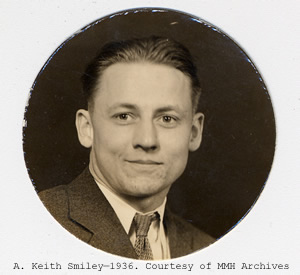 As part of the third generation of the Smiley family that founded Mohonk Mountain House, the late A. Keith Smiley (1910-2001) grew up working at the House and rose to serve as Mohonk’s chairman of the Board of Directors from 1970 to 1985. In addition to providing respite for hotel guests, Keith and his family promoted Quaker values that included hosting discussions and conferences to encourage living in harmony with the earth and bringing about peace in the world. To make that mission more concrete, in 1963, with family members and friends, Keith and his brother Daniel founded The Mohonk Trust (TMT). Now known as the Mohonk Preserve it is a nearly 8,000 acre, non-profit nature preserve established to provide public recreation, scientific research, and address global environmental concerns. What is remarkable about Keith is that his twentieth-century ideas of how to live sustainably on the earth are even more crucial today for the survival of all life on the planet. A life-long Quaker, he lived and acted upon his principles. Keith used these ideas to create a mission for Mohonk Consultations.
As part of the third generation of the Smiley family that founded Mohonk Mountain House, the late A. Keith Smiley (1910-2001) grew up working at the House and rose to serve as Mohonk’s chairman of the Board of Directors from 1970 to 1985. In addition to providing respite for hotel guests, Keith and his family promoted Quaker values that included hosting discussions and conferences to encourage living in harmony with the earth and bringing about peace in the world. To make that mission more concrete, in 1963, with family members and friends, Keith and his brother Daniel founded The Mohonk Trust (TMT). Now known as the Mohonk Preserve it is a nearly 8,000 acre, non-profit nature preserve established to provide public recreation, scientific research, and address global environmental concerns. What is remarkable about Keith is that his twentieth-century ideas of how to live sustainably on the earth are even more crucial today for the survival of all life on the planet. A life-long Quaker, he lived and acted upon his principles. Keith used these ideas to create a mission for Mohonk Consultations.
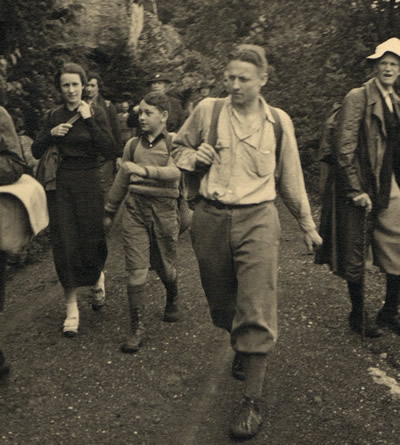
He lived out his philosophy by gently sharing his ideas, or as he would say, “leading from behind.” Keith recognized that the people who carry out any project must also be a part of the decision-making process. He often sought out individuals in positions of leadership. One of those was Noel Brown, Director of the United Nations Environment Programme. Unlike many “environmentalists” of the time, Keith always included people as an integral part of the environment. He realized that getting things done “with enduring benefits to all concerned” must involve reconciliation and consensus-building, cornerstones that he built into Mohonk Consultations’ mission. Reading widely, Keith was influenced by many great thinkers such as Barbara Ward, who wrote,
“The planet we are creating is one in which no nation, no race, no culture can escape a truly global destiny. There is no choice about this fact. The only choice available is to recognize it—and to do so in time” (“Progress for a Small Planet,” Sept–Oct 1979 Harvard Business Review).
At the same time, Keith showed a cutting-edge perspective and outlined challenges ahead by quoting Lester Brown in World Without Borders:
“Any effort to reshape the future must begin with you and me. Being a taxpaying, law-abiding citizen who votes regularly is no longer enough to ensure our future. Our circumstances require that we become politically active, not in [partisan] politics, but in terms of our self interest and that of our children. We begin with the formulation of a new ethic … [that] must seek harmony between man and nature and encompass an ideology of global unification.”
Dr. Paul C. Huth, Director Emeritus of the Mohonk Preserve’s Daniel Smiley Research Center has noted the influence of Aldo Leopold on Keith’s work in co-founding both The Mohonk Trust and Mohonk Consultations. Keith lamented people’s alienation from the physical universe, each other, and from history and tradition. He feared overwhelming damage to the Earth’s natural systems and the defeat of human purposes that could result in scarcity and losses of civil freedoms. He rejected the then dominant belief in an unlimited abundance of earth’s resources and the ability of science and high technology to overcome all problems. But rather than accept “the options of doing nothing or attempting to restrain or to abandon technology and basic amenities,” Keith believed that groups of people working together could:
- perceive relationships between all the various parts of the earth’s ecosystem
- relate with planet Earth, with each other, and with the cultural patterns of other persons
- change perspectives and values, alter attitudes and feelings, and transform the physical environment with much greater care.
A group could achieve these goals by putting together a “map” of each situation, considering a variety of methods to deal with problems before taking action, and emphasizing specific, practical situations, rather than generalized ones. That proposal became the model of his Mohonk Consultations work, which he believed could help save people and the planet. On his retirement from Mohonk Consultations in 1993, Keith shared three core ideas that had formed the basis of his life’s work:
- There will be no real peace and justice until all people are free of hunger, basic disease and the threat of annihilation –and have the right to be involved in their own decision-making procedures.
- The well-being of all people and the well-being of the planetary ecosystem cannot be dealt with separately.
- Achievement of the process of self-determination by local groups or country-wide and world-wide assemblies requires a special style of leadership.
Keith was never limited by his geographic roots or his local occupations and was truly a man for all seasons.
Keith Smiley Personal History
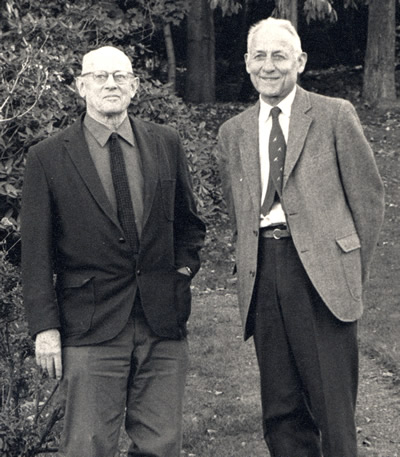
Born at Mohonk Lake in 1910, Keith acquired his profound understanding of how the earth “works” as he played and explored on his home turf in the Shawangunks. Often with his elder brother Dan, he fished, skated on the lake, hiked, skied, climbed trees and cliffs, made Maple syrup and sat and listened. Birds were of special interest to the brothers. The two also began an intensive study and record of the natural history of the area that Dan later developed into a world-class research center now part of the Mohonk Preserve and involved in studies of global climate change. See NYTimes, a version of this article appeared in print on September 16, 2008, on page F1, New York edition. The selected activities listed below showcase Keith’s Quaker-related work and honors that he and the Smiley family earned.
Quaker Activities
- Friends World Committee, Section of the Americas (1962-82)
- Clerk of Committee on Sharing the World’s Resources (1973-82)
- World Service
- New Call to Peacemaking, joint project of the Mennonites, Brethren and
- Quakers (1977-79)
- New York Yearly Meeting, Religious Society of Friends
- Clerk of Ministry and Counsel (1960-62)
- Chair of Committee for Study of Faith and Beliefs (1959-63)
- Chair of Committee on Revision of Book of Discipline, Faith section (1959-63)
- Quaker United Nations Office
- Committee for Quaker House, retreat for UN Delegates
- Committee on Revision of Human Rights, Declaration, Rights of the Child
- CODEL (Coordination in Development)
- Committee on Environment and Development (1979-92)
Honors
- Haverford College Award of Merit (jointly with Dan Smiley)
- Mid-Hudson Pattern for Progress Quality of Life in the Hudson Valley Award (1992)
- In 1994 A. Keith Smiley and his family were recognized for their environmental stewardship by a United Nations Environmental Award.
[one-half-first]
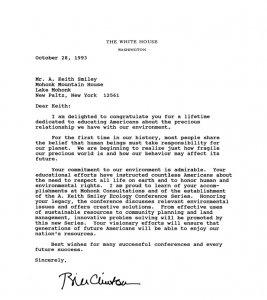
[/one-half-first] [one-half]
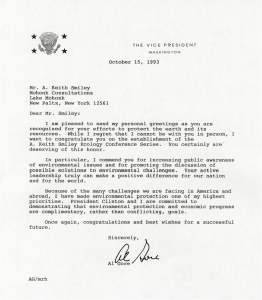
[/one-half] To spread his beliefs further, Keith self-published several pamphlets that focused on people living in harmony with the planet and each other: The Importance of Trees, The Importance of Walking and The Importance of Networking. During the rest of his life, he walked daily in the woods and traveled to many countries around the globe with his wife, Ruth. They always found inspiration in the world’s different cultures and natural wonders—reinforcing the idea of the interconnectedness of all life on earth—a theme that informed his life’s work. His long and productive life ended in 2001 at the age of 91. He was widely and publicly lauded for his dedication to the environment and his work for world peace.